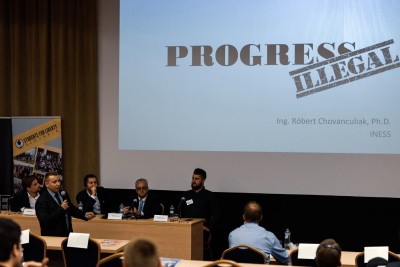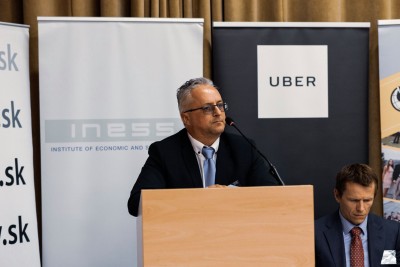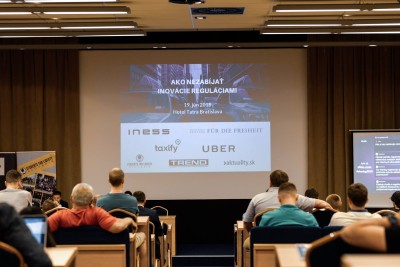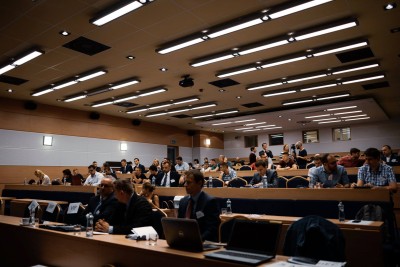The sharing economy revolutionized providing of services. It allowed utilization of unused capital, it creates pressure on improvement of the quality of services through mechanisms of reputation and it brought about new ways of earning money. Despite all benefits for both the providers and the customers, conflicts between traditional providers of services and sharing economy platforms have emerged.
INESS organized the international conference “Do Regulations Kill Inovation? on June 19, 2018, focusing directly on the sharing economy, its potential for the future, and regulatory environment issues.
At the beginning, Richard Ďurana, the director of INESS, greeted the attendees. In his remarks he stressed the importance of innovations for the human progress and repetitive conflicts from the past which arise from new technologies implementation into manufacturing or services providing.
The first discussion panel dedicated to the future of the sharing economy in Slovakia followed, with Martin Vlachynský from INESS as a moderator. The first speaker was Branislav Kmeť, the CEO of Carrivederci, a carsharing company. He talked about business beginnings, the origins of a peer-to-peer carsharing idea in Slovakia, and about the regulatory burden they had to cope with in the first days of their operations.
 Afterwards, a speech by Aleš Rod, the director of research of CETA, was delivered. In his remarks he talked about innovations in the past which gradually lead to the old services or products becoming obsolete. For instance, he mentioned the example of video tapes or the trend of digitalization which caused massive decrease in transaction costs, leaving many unprepared.
Afterwards, a speech by Aleš Rod, the director of research of CETA, was delivered. In his remarks he talked about innovations in the past which gradually lead to the old services or products becoming obsolete. For instance, he mentioned the example of video tapes or the trend of digitalization which caused massive decrease in transaction costs, leaving many unprepared.
The side effects of sharing services advancement are also remarkable. After Uber’s establishment in New York, the overall number of complaints concerning common taxi services dropped. Mr Rod underlined the fact that the impact of sharing services on real estate prices in the V4 region is exaggerated.
The director of the Association of Hotels and Restaurants of Slovakia Marek Harbuľák told that the sharing economy should not be seen as a competitor for the traditional accommodation sector but rather as a partner. He pointed out the need to have a serious discussion and a strategy defining whether it is even necessary to regulate the sector and how to do that. At the end he expressed his support for a massive reduction of regulations in the accommodation sector which is becoming ever more intense with the rise of technologies.
The conclusion of the panel came with Alexander Funcke, a researcher from the University of Pennsylvania and a co-operator of the Swedish think-tank Timbro. In his speech he laid out the definition of sharing economy they had used while creating the Index of Sharing Economy. He described two essential factors they took into consideration to put countries into order based on their score: confidence and economic freedom. A discussion of the panelists with the audience followed.
 The second panel was moderated by Radovan Ďurana from INESS. He introduced the first speaker of the panel – the Estonian MP Kalle Palling who is the author of the law legalizing ridesharing in Estonia. The speaker stressed out the significance of innovations for the human progress and also for politics. Legalizing carsharing, which casues a decrease in a number of cars in cities, is in his opinion an outstanding tool. He also mentioned few benefits of carsharing services such as taking children to school in the morning, assistance to the elderly or an opportunity to make money for the providers and to cut down on costs for the users.
The second panel was moderated by Radovan Ďurana from INESS. He introduced the first speaker of the panel – the Estonian MP Kalle Palling who is the author of the law legalizing ridesharing in Estonia. The speaker stressed out the significance of innovations for the human progress and also for politics. Legalizing carsharing, which casues a decrease in a number of cars in cities, is in his opinion an outstanding tool. He also mentioned few benefits of carsharing services such as taking children to school in the morning, assistance to the elderly or an opportunity to make money for the providers and to cut down on costs for the users.
The second to speak was Robert Chovanculiak from INESS. In his presentation he defined the ban of sharing services offering as a ban of achieving progress. He brought forward a number of examples from the past when the regulator aimed at prohibiting arising internet services simply because they did not fit into the legislative provisions at the time. Thus, rigid legislation creates barriers for us to benefit from innovations. In the past this was the case of services like PayPal or Ebay which brought innovative solutions. However, the offensive campaign of traditional competitors’ services almost put an end to their operations.
 Then Mark Boris Andrejanič, the member of the public policy team of the company Uber, came up with his entry. Starting his speech, he focused on the issues of traffic jams and air pollution caused by excessive numbers of vehicles in cities. He proceeded with a presentation of solutions offered by Uber, he laid out a few innovation they had implemented, and also plans for the future.
Then Mark Boris Andrejanič, the member of the public policy team of the company Uber, came up with his entry. Starting his speech, he focused on the issues of traffic jams and air pollution caused by excessive numbers of vehicles in cities. He proceeded with a presentation of solutions offered by Uber, he laid out a few innovation they had implemented, and also plans for the future.
The discussion would not be complete without professional views of public sector representatives. Director of the Transport Authority Bohuš Chochlík from the Ministry of Transport came to present the opinion of the sharing economy regulator. In his speech he talked about preparation of a bill that is supposed to significantly reduce the bureaucratic burden for the traditional taxi companies as well.
For example, the required age of 21 for a taxi driver is omitted in the bill, based on the assumption that there is no direct link between a driver’s experience and age. Chochlík told the audience that when the driver gets the license at the age of 21 he has not as much experience as a driver who had the license from the age of 18. The bill will also not include the regulation concerning the number of doors in a vehicle or other provisions regarding the vehicle’s appearance.
The concluding statements were delivered by Matej Beňuška who works as an expansion manager in the company Taxify. He laid out the company’s position on the carsharing market and its operations in individual countries. Education, technologies, and human capital were underlined as three essential pillars that serve as fabrics of Taxify’s day-to-day business. He regrets that Uber was banned in Bratislava because a healthy competitive environment is necessary for good functioning of services not only for the customers but also for the drivers.
 A discussion followed, with the speakers answering the questions from the audience. According to Kalle Palling, cryptocurrencies in the business are, in his opinion, meant to be accepted because such transactions are becoming ever more common.
A discussion followed, with the speakers answering the questions from the audience. According to Kalle Palling, cryptocurrencies in the business are, in his opinion, meant to be accepted because such transactions are becoming ever more common.
Matej Beňuška spoke about the prerequisites of the functioning sharing services with a follow-up reaction of Mark Boris Adrijanič stating that it is possible to establish a carsharing business even in smaller cities or isles with a couple of hundreds of citizens. But he agreed that the crucial role is played by regulations and technologies.
The conference was attended by over 100 participants, among them a Slovak MP, representatives of ministries and NGOs, students, and a wide public.
All of this would have been impossible to deliver without the support of our partners, among them Friedrich Naumann Stiftung für die Freiheit, Taxify, Uber, Slovak Students for Liberty or Aktuality.sk, and Trend who were responsible for providing the media attention.



